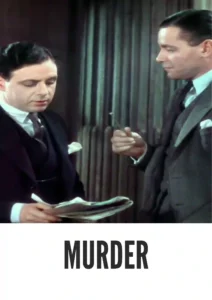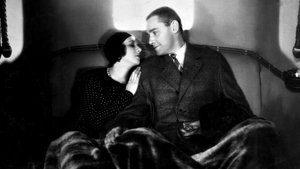Contact: info@alwanfilm.com
Video Sources 0 Views
- Watch trailer
- Murder!


Synopsis
Table of Contents
ToggleReview: Murder 1930 Colorized – A Gripping Whodunit Unraveled in Vivid Detail

Introduction
“Murder!” (1930) emerges as a captivating portrayal of intrigue and suspense, offering audiences a thrilling journey into the heart of a mystery. This article delves into the significance of this early colored film, exploring its impact on viewers and its enduring legacy in the realm of crime dramas.
Check The Full Colorized Movies List
Check Our Colorized Movies Trailer Channel
Understanding Murder 1930 Colorized: Director, Cast, and Genre
Directed by the legendary Alfred Hitchcock, “Murder!” (1930) showcases his flair for suspenseful storytelling and meticulous attention to detail. The film boasts a talented cast, including Herbert Marshall and Norah Baring, who deliver compelling performances that keep viewers on the edge of their seats. Blending elements of mystery, drama, and psychological thriller, “Murder!” (1930) immerses audiences in a world where nothing is as it seems and danger lurks around every corner.
Exploring the World of Murder 1930 Colorized: Plot and Characters
Murder! 1930 unravels the mystery surrounding the brutal killing of a young actress and the subsequent investigation to uncover the truth. As the plot thickens and suspects emerge, viewers are drawn into a web of deceit and deception, where secrets lurk in the shadows and motives remain shrouded in mystery. With its compelling characters and twist-filled narrative, Murder! 1930 keeps audiences guessing until the very end.
The Art of Film Colorization
Film colorization serves as a transformative tool that enhances the visual experience of classic movies, breathing new life into timeless stories and captivating audiences with vibrant hues. By digitally adding color to black and white films, colorization allows viewers to immerse themselves in the rich tapestry of cinematic worlds, exploring every nuance and detail with fresh eyes and renewed appreciation.
Early Colored Films: A Brief History
The history of colored films traces its roots back to the early days of cinema, with filmmakers experimenting with various techniques to add color to their creations. From hand-tinted frames to early Technicolor processes, the evolution of colored film has been marked by innovation and ingenuity, paving the way for the development of modern colorization techniques that continue to captivate audiences to this day.
Murder! 1930 and Its Early Colored Version
The decision to release “Murder!” (1930) in a colorized format offers audiences a fresh perspective on this classic whodunit, enhancing its visual appeal and immersing viewers in its atmospheric world. While purists may debate the merits of colorization, the early colored version of “Murder!” (1930) introduces the film to a new generation of viewers and ensures its continued relevance in the annals of cinematic history.
The Debate Over Film Colorization
The debate over film colorization continues to divide audiences and critics alike, with proponents praising its ability to breathe new life into classic movies and introduce them to a new generation of viewers, while detractors argue that it compromises the artistic integrity of the original work and diminishes its historical significance. As the debate rages on, filmmakers and audiences alike are left to ponder the merits and drawbacks of colorization in the ever-evolving landscape of cinema.
Examining Murder! 1930 as an Early Colored Film
As with any colorized classic, the impact of colorization on “Murder!” (1930) is a matter of personal interpretation. Some may argue that it enhances the film’s visual appeal and immerses viewers in its world, while others may feel that it detracts from the stark beauty of the original black and white version. Regardless of one’s stance on the issue, there’s no denying the enduring power of “Murder!” (1930) as a timeless crime drama that continues to captivate audiences with its gripping narrative and unforgettable characters.
Influence and Legacy: Murder 1930 Colorized’s Impact on Cinema
“Murder!” (1930) has left an indelible mark on the world of cinema, inspiring countless filmmakers and captivating audiences with its masterful storytelling and atmospheric cinematography. From its unforgettable performances to its twist-filled plot, the film continues to resonate with viewers of all ages, reaffirming its status as a beloved classic of the crime drama genre.
Director’s Cinematic Legacy: Beyond Murder 1930 Colorized
Alfred Hitchcock’s influence extends far beyond “Murder!” (1930), with a diverse body of work that continues to captivate audiences around the globe. From “Psycho” to “Vertigo,” Hitchcock’s films are celebrated for their suspenseful narratives, memorable characters, and innovative techniques, solidifying his legacy as one of the greatest directors in cinematic history. Through his groundbreaking work, Hitchcock has left an indelible imprint on the world of cinema, inspiring generations of filmmakers to follow in his footsteps.
Themes Explored in Murder 1930 Colorized
“Murder!” (1930) explores a myriad of themes, from the nature of guilt and innocence to the quest for justice in a world filled with moral ambiguity. Through its richly drawn characters and atmospheric setting, the film invites viewers to ponder the complexities of the human psyche and the consequences of our actions. As audiences immerse themselves in the world of “Murder!” (1930), they are reminded of the enduring power of cinema to provoke thought and ignite the imagination.
Reception and Controversy Surrounding Murder 1930 Colorized
Upon its release, “Murder!” (1930) received widespread critical acclaim, with many praising its suspenseful plot, atmospheric cinematography, and standout performances. However, the decision to release the film in a colorized format sparked debate among purists, reigniting the age-old discussion surrounding film preservation and artistic integrity. Despite the controversy, “Murder!” (1930) remains a beloved classic that continues to captivate audiences with its timeless tale of mystery and suspense.
Where to Watch Murder 1930 Colorized Online
For those eager to experience the timeless magic of “Murder!” (1930), the film is readily available on popular streaming platforms such as Netflix, Amazon Prime, and Hulu. Whether you choose to watch it in its original black and white format or the early colored version, “Murder!” (1930) promises to transport you to a world of intrigue and suspense, where nothing is as it seems and danger lurks around every corner.
FAQs About Murder 1930 Colorized
Q: Is Murder! 1930 based on a true story? A: No, “Murder!” (1930) is a fictional tale crafted by screenwriters Alfred Hitchcock and Walter C. Mycroft, drawing inspiration from various sources to create a suspenseful whodunit that keeps audiences guessing until the very end.
Q: Who are the main actors in Murder! 1930? A: “Murder!” (1930) features an ensemble cast led by the talented Herbert Marshall and Norah Baring, whose performances captivate audiences with their depth and nuance.
Q: What awards did Murder! 1930 win? A: While “Murder!” (1930) did not win any major awards, it received critical acclaim for its suspenseful plot, atmospheric cinematography, and standout performances.
Q: Why was “Murder!” (1930) released in a colorized format? A: The decision to release “Murder!” (1930) in color was made to introduce the film to a new generation of viewers and enhance its visual appeal for modern audiences. While the choice to colorize the film sparked debate among purists, it ultimately allowed “Murder!” (1930) to reach a wider audience and ensure its continued relevance in the annals of cinematic history.
Conclusion
Murder! 1930 remains a timeless classic that continues to captivate audiences with its suspenseful plot, atmospheric cinematography, and standout performances. Whether viewed in its original black and white format or the early colored version, “Murder!” (1930) promises to transport you to a world of mystery and intrigue, where danger lurks around every corner and nothing is as it seems. So, whether you’re a seasoned cinephile or a casual moviegoer, take a moment to revisit “Murder!” (1930) and experience the magic of Hitchcock’s timeless masterpiece.











